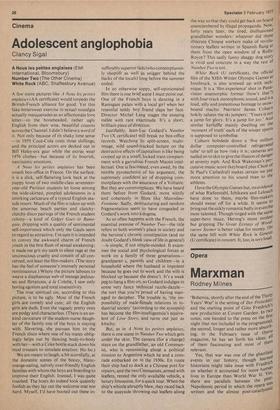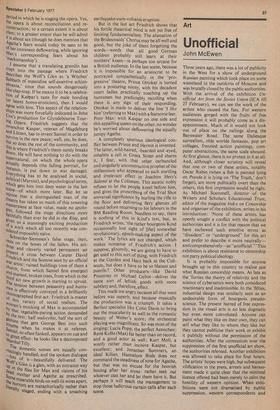Opera
Marxman
Rodney Milnes
'Bohemia, shortly after the end of the Thirty Years' War' is the setting of Der Freischa' and the starting point of Gifitz Friedrichs new production at Covent Garden. In tw° notes, one handed to the press on the first night (but not included in the program' the second, longer and rather more absorbing, in the February issue of magazine, he has set forth his ideas, a" of them fascinating and most of the' relevant. Yes, that war was one of the ghasdies! events in our history, though learned, historians might take issue with Friedrich on whether it accounted for more hurrah lives in Europe than World War II. Yes' there are parallels between the Post: Napoleonic period in which the opera wtr written and the almost post-cataclYshlic Period in which he is staging the opera. Yes, the opera is about reconciliation and reconstruction; to a certain extent it is about class; to a greater extent than he will admit it is about sex (though he does mention that Agate's fears would today be seen to be of her imminent deflowering, while ignoring ,Max's corresponding fears about his Marksmanship'). 1 assume that a translating gremlin has crept into the passage where Friedrich describes the Wolf's Glen as 'a Witches' Sabbath of masculine self-assertive schizoPhrenia,' since that sounds dangerously like clap-trap. If he means it to be a celebration of Katpar's taste for male bonding (or latent homo-eroticism), then 1 would agree with him. This aspect of the relationships was more forcefully indicated in John Cox's production for Glyndebourne Touring Opera. Friedrich suggests that the revanchist Kaspar, veteran of Magdeburg and Lihzen, has to invent Samiel in order to survive in the new peace; well, yes, he does, but so does the rest of the community, and this is where Friedrich's thesis surely breaks down. He will have nothing to do with the supernatural, on which the whole opera actually depends (the falling portrait, for instance, is put down to war damage). Everything has to be analysed in social, Political (Marxist), and psychological terms, Which gets him into deep water in the last scene—of which more later. But let us rejoice that a distinguished man of the theatre has taken so much of this towering masterpiece at face value, made no apologies, followed the stage directions more faithfully than ever he did in the Ring, and given us a stunningly exciting production of a work which all too recently was considered impossibly naïve. Schneider-Siemssen's false stage, then, rests on the bones of the fallen. His actnroP and cleverly varied permanent set Present a cross between Caspar David Friedrich and the Somme seen by an official war artist : ruined buildings (one of them a church, from which Samiel first emerges) ,a.nci stunted, broken trees, from which in the .ruurd act new growth is starting to sprout. The tension between peasantry and hunts n-1,en is effectively conveyed in a brilliantly cnoreographed first act : Friedrich is master Of this variety of social realism. The w k omen's mocking of Max is accompanied ;IY that vegetable-paring action demanded by the text : half malocchio, half the sort of esture that gets George Best into such trouble when he makes it at referees. sr.aMiel, so often funked, appears on cue and to great effect : he looks like a decomposed Marshal Tilly. The domestic scenes are equally convincingly handled, and the spoken dialogue --vs,' ts of it—beautifully delivered. The °it's Glen is a glen, with an entrance way 4 i_,11 the flies for Max and visions of his s'au mother and Agathe as prescribed. tin.(1nle miserable birds on well-lit wires apart, lit: horrors are metaphorically rather than rally staged, ending with a smashing
earthquake-cum-volcanic eruption.
But in the last act Friedrich shows that his fertile theatrical mind is not yet free of limiting fundamentalism. The alienation of the Bridesmaids' Chorus may be all well and good, but the joke of them forgetting the words—words that all good German children probably still learn at their mothers' knees—is perhaps too arcane for a British audience. In the last scene, because it is impossible for an aristocrat to be portrayed sympathetically in the 'progressive' theatre, Prince Ottokar is turned into a posturing ninny, with his decadent court ladies practically touching up the huntsmen but predictably recoiling when there is any sign of their responding. Ottokar is made to deliver the line 'I like him' (referring to Max) with a fearsome leer. Poor Max: with Kasper on one side and this appalling queen on the other, no wonder he's worried about deflowering the equally jumpy Agathe.
A completely spurious ideological conflict between Prince and Hermit is invented. The latter, wild-haired, -bearded and -eyed, inhabits a cell in Greek Street and shares it, 1 fear, with that other carbuncled and singularly unconstructive prophet of the millennium who appeared to such startling and irrelevant effect in Joachim Herz's Salome at the Coliseum. This ascetic nobly refuses to let the people kneel before him, and gives the proscribing of the Trial Shot universal significance by hurling the rifle to the floor and delivering fiery glances all round before returning to his labours in the BM Reading Room. Needless to say, there is nothing of this in Kind's text, but, as Friedrich writes, 'the rather bourgeois Kind occasionally lost sight of [the] somewhat revolutionary, epoch-making aspect of the work.' The lyrics are not changed, which makes nonsense of Friedrich's action. I
suppose, gloomily, we are going to have to get used to this sort of thing, with Friedrich at the Garden and Herz back at the Coli
seum, but does it have to be so blatant and puerile? Other producers—like David
Pountney or Michael Geliot—deliver the same sort of leftish goods with more subtlety and, therefore, effect.
This made me angry because all that went before was superb, and because musically the production was a triumph. It takes a Berlioz specialist like Colin Davis to bring out the muscularity as well as the romantic beauty of Weber's score; the orchestral playing was magnificent. So was most of the singing: Lucia Popp, the perfect Aennchen; Rene Kollo (Max) far better than on record, and a good actor as well; Kurt Moil, a woofy rather than incisive Kaspar, but excellent ; and Jonathan Summers, an
ideal Kilian. Hannelore Bode does not command the steadiness of tone for Agathe,
but that was no excuse for the boorish
booing after her scena: rather seek out whoever cast her and let them have it. But
perhaps it will teach the management to stop those ludicrous curtain calls after each scene.



































 Previous page
Previous page